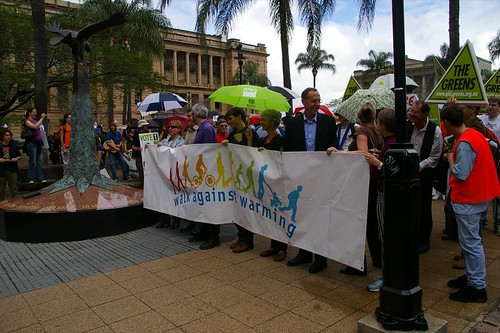From New Internationalist and George Monbiot's book "Heat".
George Monbiot resists the urge to do battle in a fog of meaningless statistics.
Now that the dismissal of climate change is no longer fashionable, the professional deniers are trying another means of stopping us from taking action. It would be cheaper, they say, to wait for the impacts of climate change and then adapt to them. They have the figures to prove it. It is tempting to prove them wrong. Given the new projections of major drought in continental interiors, of a possible global food deficit, of sea level rises with the potential to affect billions of people, it should be easy to demonstrate that the price of waiting for the catastrophe is higher than the price of reducing emissions. But it’s a temptation we should resist. Such calculations use costs which simply cannot be compared. The most famous exponent of the comparison is the Danish statistician Bjørn Lomborg. In his book The Skeptical Environmentalist, he argues that the cost of doing nothing about climate change – of letting nature take its course – is $4,820 billion. The cost of stabilizing global temperatures at 2.5° above the 1990 level would be $8,553 billion; and the cost of stabilising them at 1.5° above the 1990 level would be $37,632 billion. He warns that ‘with the best intentions of doing something about global warming we could end up burdening the global community with a cost much higher or even twice that of global warming alone’. It would be better to use our money to make investments with higher returns, leaving ‘future generations of poor people with far greater resources’.
Many environmentalists have taken him to task, claiming that his costs for taking action are too high and his costs for the impacts of climate change are too low. But they have been drawn into a fake debate. For while the costs of taking action can reasonably be measured in dollars, most of the costs of climate change cannot.
We are told, for example, that the financial costs of Hurricane Katrina, which may have been exacerbated by climate change, amount to some $75 billion, and we can use that number to help derive a price for carbon pollution. But does it capture the suffering of the people whose homes were destroyed? Does it reflect the partial destruction, in New Orleans, of one of the quirkiest and most creative communities on earth? Does it, most importantly, measure the value of the lives of those who drowned?
In other words, is it possible to place an economic price on human life? Or on an ecosystem, or on the climate? Could such costs, when rolled out around the world, really be deemed to amount to $4,820 billion, give or take the odd dollar? Such figures are not just wrong. They are meaningless.
When economists have tried to put a price on such things, they have simply exposed the limitations of their science. In 1996, for example, a study for the Intergovernmental Panel on Climate Change estimated that a life lost in the poor nations could be priced at $150,000, while a life lost in the rich nations could be assessed at $1.5 million. The researchers produced these figures by estimating how much people would be prepared to pay for the adaptive measures that would save their lives. Unsurprisingly, they discovered that the lives of rich people were worth more than the lives of poor people.
These days, economists are less prepared to expose themselves to ridicule. So anything that cannot be quantified is simply excluded from the balance sheet. What this means is that the loss of all the really important things – a functioning ecosystem, human communities, human life – is overlooked. Because they aren’t counted, they don’t count.
It would be wrong to blame only Bjørn Lomborg and the economists whose work he promotes for taking this line. Almost everyone feels obliged to attach a price tag to global catastrophe. The British Government, for example, has decided that the ‘social cost’ of carbon emissions is somewhere between $60 and $250 per tonne, with a middle value of $120. We might reasonably ask what the heck this means. Does the British Government really believe it can put a price on the people of Africa? On Bangladesh?
...
Read the article.
Sunday, February 11, 2007
Cost of climate change
Posted by
National Enquirer
at
6:14 pm
![]()
Labels: climate change, economic cost of climate change, george monbiot, new international
Subscribe to:
Post Comments (Atom)





No comments:
Post a Comment